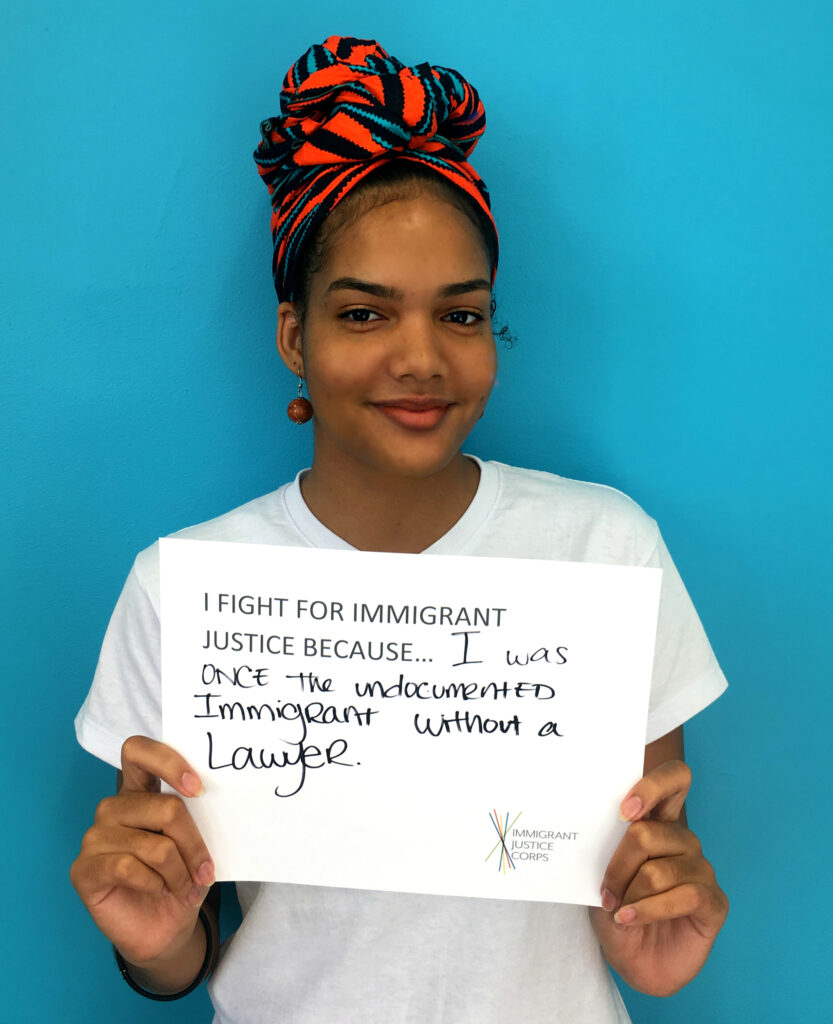Where are they now?: Erika Nyborg-Burch
In the “Where are they now?” series, we introduce you to former IJC Fellows and share their stories — how they became a Fellow and how their Fellowship experience informs their work today.
Erika Nyborg-Burch, a 2018 Justice Fellow with The Bronx Defenders, is a Clinical Professor of Law at Florida State University College of Law and Director of the Farmworker and Immigration Rights Clinic.
What is one day from your Fellowship that sticks out in your memory?
The day that most sticks out in my memory is a day that one of my clients won asylum in the Varick Street Immigration Court. Helping our client win his case really felt like a team effort. On the day of the hearing, my supervisor and our social worker were in court, and we all got to see the joy on our client’s face when he heard the judge’s decision.
Our client had been brought into immigration court from detention, and his arms and ankles were shackled. Despite these shackles, when he heard the decision, he tried to jump up in excitement. I think he was so relieved. But even though he won asylum that day, and even though DHS didn’t appeal, he was taken back into detention, which was incredibly frustrating.
While his case was pending, he had a really tough time in the county jail where ICE was detaining him. The jail charged him with having contraband and referred his case to the prosecutor’s office, and the prosecutor brought felony charges. That charge was still pending when he won asylum, and the jail wouldn’t release him. So we worked with criminal defense attorneys in that county to continue advocating for him. Eventually the charge was reduced to a misdemeanor, and he got released. He would come visit our office to work with the social worker and would stop to update me on his life.
So that was a day I remember, but also a relationship I remember. I got to be part of the team as he continued to work with our social worker to find a place to live and get his identity documents and restart his life after having it interrupted by that period of detention and removal proceedings. I think it was an experience that showed that winning asylum is just one part of a process of helping clients navigate structural barriers that can make them more exposed to harm.
What was the most difficult part of your time as a Fellow? Any tips for facing it?
The most difficult part of my time as a fellow was figuring out how to manage a full docket of cases for clients with different needs. I was working with a lot of clients who had cases in immigration court, and most of these clients were also being held in immigration detention centers. The cases moved more quickly than non-detained cases and everything seemed urgent – most people had some kind of hearing coming up in a few days, or a week, or a month. It was hard to learn that, among all the levels of urgency, there were different degrees of immediacy, and I couldn’t work through all of the challenges as quickly as I wanted to as just one (very new) attorney. Instead of just being completely overwhelmed by the stakes and the number of projects for each person’s case on my plate at any given moment, I had to figure out what needs to happen first and then what’s going to happen second, and make a plan for everything to get done in time and in its time.
I still rotate between different organizational models, but I try to teach my students to keep track of all of the projects for each of their cases and the steps to complete each of those projects, and then practice regularly revisiting what the priorities are and whether any of those need to shift. Sometimes I still wake up at 3am and realize, ‘Oh, I should have revisited that list yesterday’ or ‘What about this question that I haven’t answered for a case,’ but this organizational strategy provides a system to fit those moments of anxiety into a plan.
At the Bronx Defenders, I was really lucky to collaborate with social workers and case managers, and sometimes they knew better than I did what needed to be done, or what the next step was. It’s really important to learn to work on teams that are different from who you may have worked with in the past. In law school, I was mostly working on teams with other law students, and it was amazing to learn from people who had different expertise, as well as collaborating with other IJC Fellows and other attorneys at the Bronx Defenders.
Do you have any advice for incoming Fellows?
I think just leaning on the community that surrounds you. Remember that nobody expects you to know everything, so give yourself the grace to ask questions, to make mistakes on your drafts and learn from the feedback. And reach out to the people who are part of your community through IJC. During the Fellowship, we had people who came in to teach us about all different areas of the law. Remember that those people and IJC alum can be resources for you as you can continue with your first year and second year. Fellows can also be an incredible resource for each other. It has become ever more clear to me over time that having a network of people who rely on each other for advice and for strategy sessions is incredibly important. And work can sometimes be really hard, and so community is also such an important antidote to all the aspects of the system that can make you feel powerless or frustrated or demoralized.
